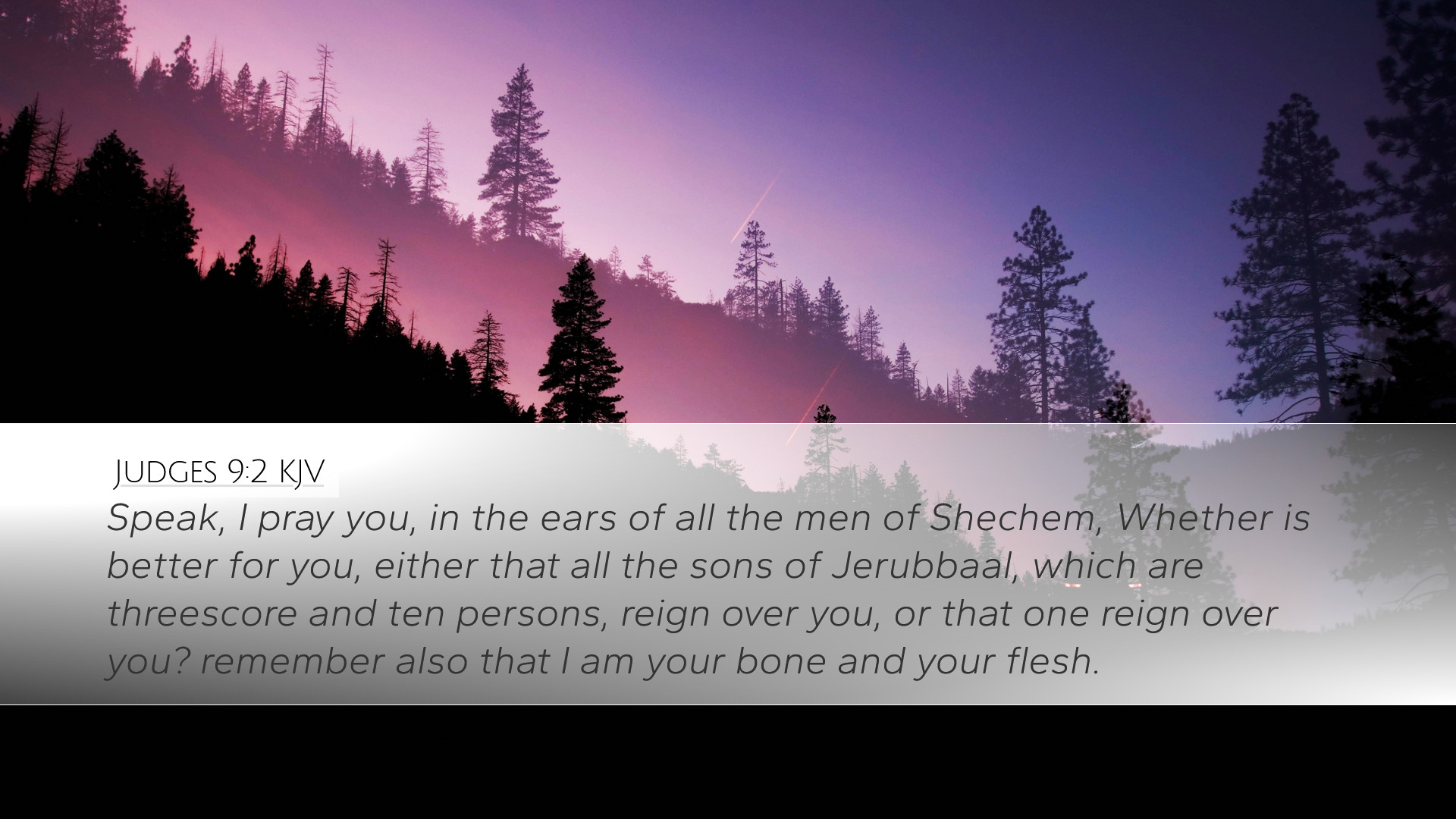Commentary on Judges 9:2
Judges 9:2 states, “Speak, I pray you, in the ears of all the men of Shechem; Whether is better for you, either that all the sons of Jerubbaal, which are threescore and ten persons, reign over you, or that one reign over you? Remember also that I am your bone and your flesh.” This verse comes from the narrative concerning Abimelech, the son of Gideon (also known as Jerubbaal), as he seeks to consolidate power and persuade the people of Shechem to support him as king.
Contextual Overview
In the broader context, this chapter describes a pivotal moment in the history of Israel, revealing the struggles between loyalty to God and the desire for a human king. The actions and words of Abimelech should be assessed in light of God’s covenant with the Israelites and the cyclical nature of Israel's disobedience and the resulting chaos. Each public domain commentary provides valuable insights regarding this complex narrative.
Insights from Matthew Henry
Matthew Henry interprets this verse as a shrewd political maneuver by Abimelech. He emphasizes the nature of Abimelech's appeal to the Shechemites, as he exploits their desire for leadership by offering them a choice. Henry notes that the mention of “all the sons of Jerubbaal” serves a dual purpose: on one hand, it illustrates the multitude of claimants to leadership, while on the other hand, it highlights his own legitimacy, being a son of Gideon. He remarks:
“He calls them to consider whether the rule of many or one is better, implying that in these troubled times, division may lead to chaos.”
Divine Context vs. Human Desire
Henry observes that this search for a king represents a departure from God's intended leadership. The author of Judges, in presenting Abimelech's proposal, suggests a critical theological point—God’s design for Israel was not for them to be ruled by man but to dwell under divine sovereignty. Moreover, Henry critiques Abimelech’s character, noting:
“He is not just offering a choice but is inherently revealing his own ambition, under the guise of caring for his people.”
Insights from Albert Barnes
Albert Barnes provides a detailed analysis of the implications of Abimelech’s speech, focusing on the political aspects and its moral ramifications. He elucidates the phrase “bone and flesh,” interpreting it as a reference to close kinship and loyalty. Barnes asserts:
“Abimelech attempts to establish his authority not on the grounds of God’s choice, but rather through human connections and nepotism.”
He points out the broader implications of selecting a human leader in lieu of God, noting Israel's desires mirrored those of neighboring nations who sought kings. Barnes posits that this moment is a reflection of a deeper theological failure:
“Israel desired a visible monarch rather than the invisible God, revealing a fundamental shift in their faith.”
Analyzing the Choice Offered
Barnes emphasizes the strategic nature of the choice presented to the Shechemites. He views Abimelech as cleverly manipulating their dissatisfaction with the sons of Gideon, painting his rule as a more cohesive and effective alternative. The implications for this call for royal governance are far-reaching:
- The question of authority: Who truly has the right to rule?
- The danger of human leadership that disregards God’s sovereignty.
- The eventual consequences of forsaking divine guidance.
Insights from Adam Clarke
Adam Clarke remarks on the inherent violence and ambition seen in Abimelech’s approach. He comments on the fact that this verse is part of a larger narrative filled with treachery and bloodshed. Clarke interprets the statement:
“His speech demonstrates both a shrewd intellect and a morally bankrupt ambition to seize power at any cost.”
Clarke goes on to suggest that Abimelech’s plea was not just rhetorical, nor was it simply a matter of leadership preference; it embodies a profound existential dilemma for Israel regarding governance, identity, and faith. He suggests that:
“This offers a solemn reminder of the moral degradation that can ensue when leaders prioritize personal ambition over communal responsibility.”
Reflection on Leadership and Authority
Moreover, Clarke indicates that the consequences of such choices are seen throughout the following events in Judges, illustrating the destructive nature of rejecting divine leadership. He elaborates on the multifaceted implications of choosing a king:
- The potential for corruption and tyranny.
- The erosion of faith in God’s providence.
- The outcome of political and spiritual disunity.
Theological Implications
In review, the insights gathered from these public domain commentaries illuminate the complexities of Judges 9:2. The verse encapsulates critical themes of leadership, faithfulness to God versus earthly desires, and the risks of political ambition. For modern readers, particularly pastors, theologians, and scholars, this passage serves as a reminder of the ongoing struggle between divine authority and human governance, urging them to reflect on the nature of leadership within their communities and the spiritual health of the church.
Conclusion
The rich commentary from Henry, Barnes, and Clarke collectively warns against the allure of political power devoid of divine sanction. As leaders and scholars engage with this text, they are encouraged to confront the question Abimelech posed, moving beyond personal ambition toward a kingdom led by God's principles and motives. Let this verse be a reminder that true authority comes from God alone, and any deviation from this order can lead to chaos and destruction.


